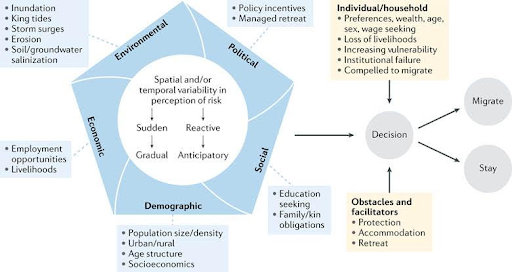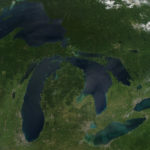Exploring Climate Migration in the Great Lakes
In the spring of 2020, ASAP began working with partners across the Great Lakes to explore what’s needed to prepare the region to receive climate migrants. This work is bringing together disparate voices and perspectives – from demographers and climatologists to natural resource managers and community based organizations – and laying the foundations for socially just and environmentally sound growth in the region. One year in, we have made progress on predicting migration, gained a foothold understanding the opportunities and needs of stakeholders and indigenous rightsholders across the region, and clarified our objectives. Read on to see what we’re learning. Be sure to check out project media coverage and connect with us in the coming year!
Predicting Future Migration
We kicked off our climate migration methodology work with a climate-informed demography workshop in December of 2020, featuring Matt Hauer, Bryan Jones, Joyce Chen, Vivek Shandas, Alex De Sherbinin, Radley Horton, Art DeGaetano, Robin Blakely-Armitage, and Kristin Marcell. Two key messages emerged: climate-informed demographic models are still a work in progress and models alone will not provide decision-ready output for community members or policymakers. In the process of developing this workshop, we learned that there is very little existing coordination between experts in different areas of this interdisciplinary field. This underscores the value of our Climate Migration Methodology Accelerator which provides a peer learning space, coordination support, and access to data and other resources. Current participants include Matt Hauer (Florida State University), Kim Channel and BJ Baule (Great Lakes Integrated Sciences and Assessments), Kelly Main and Osamu Kumasaki (Buy-In), and Ross Patel and Isaac Gendler.
“So far, this accelerator has been a wonderful opportunity for our team to learn more about climate-driven migration to, from, and within New York State, and connect with leading researchers in this field. We are currently crafting our own research objectives that center social equity and the unique qualities of household mobility in New York.”
– Isaac Gendler, Osamu Kumaska, Kelly Main, and Ross Plattel
Read the summary report from the December climate-informed demography workshop and access resources from the workshop here. Interested in participating in Climate Migration Methodology Accelerator Learning Labs? Email AcceleratorApplications@adaptpros.org.

Opportunities and challenges for in-migration to the Great Lakes
In addition to supporting methodology development, we are also creating a typology of perspectives, opportunities, and needs concerning climate migration in the region. The foundation for this is a narrative literature review, assembled by ASAP staff under the leadership of Kyle Sullivan. The review discusses “opportunities” that in-migration could bring to the region and “barriers” that could prevent institutions and residents from reaching those opportunities. It includes peer-reviewed literature, white and gray literature, and news media articles covering: Knowledge & Learning; Economy, Trade, & Industry; Human Suffering and Well-Being; and Social, Political, and Cultural Factors.
“Local institutions have both a heightened burden and opportunity to prepare for climate migration. Communities in the region may poise themselves to gain back population and economic growth while reinforcing larger climate resilience efforts and addressing historic, entrenched issues–like economic segregation–that harm growth. Partnerships with other cities or peer institutions, academic institutions, and philanthropic and for-profit organizations will be key.”
Climate and Demographic Change in the Great Lakes Region: a Narrative Literature Review of Opportunities and Opportunity Barriers
This work also includes exploratory conversations with stakeholders and indigenous rightsholders across the region, including local governments, liaisons to tribal governments, natural resource managers, businesses, and community-based organizations. These conversations serve dual purposes: to build a foundational understanding of opportunities and challenges and to ignite more interest in the topic of climate in-migration. People in the region are thinking a lot about historic challenges of population growth and change they’ve experienced to understand how to prepare for future change. This includes anticipating increased impacts to natural resources and shifting cultural and age characteristics in their communities. Changes experienced during the COVID-19 pandemic also influence what’s top of mind for people – for example, real estate booms in smaller and more rural communities.
Clarified Objectives
As we learn more, we continue to clarify how we talk about this work and our ultimate goals. One central theme has emerged: a commitment to centering affected communities, including both leaving communities (places where people are migrating from) and receiving communities (places people are moving to.) This is particularly important as researchers essentially create a new science by building and refining methodologies for predicting climate migration. We are working to ensure that the methodologies, outputs, and applications of that science become owned and controlled by affected communities. This includes involving affected individuals in activities like identifying variables for climate migration models. It also means thinking deeply about the potential consequences of applying these models – such as how model outputs may be used in decisions about housing stocks that affect housing access and affordability.
Project media coverage
Check out these media pieces where ASAP staff share insights from this work:
- ASAP Deputy Director Rachel Jacobson on Earth Refuge’s “Faces” Podcast, April 16, 2021.
- ASAP Executive Director Beth Gibbons in “Water could make Michigan a climate refuge – are we prepared?” Circle of Blue, February 2021.
Connect with us
- Sign up to receive project updates.
- Save the date for our virtual climate-informed demography workshop: December 6-8, 2021
- Interested in partnering with us? Contact ASAP Deputy Director Rachel Jacobson.
Thanks to our supporters, New York State Energy Research and Development Authority and Great Lakes Integrated Sciences and Assessments, a NOAA RISA Team.

